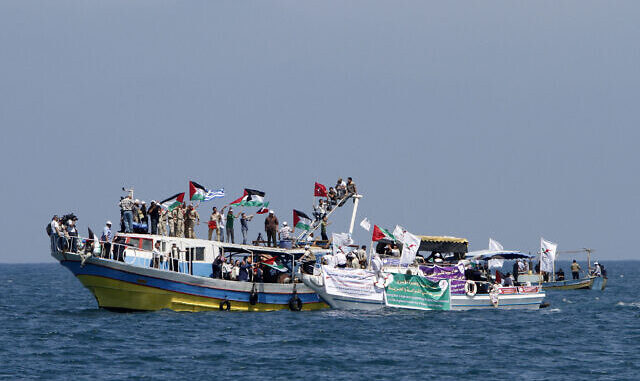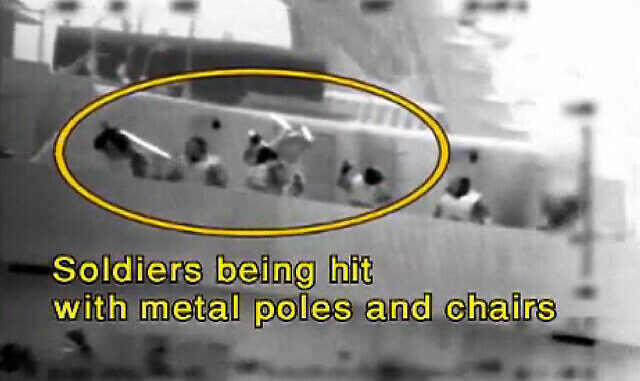T. Belman. I take this threat seriously.
Reminiscent of infamous 2010 Mavi Marmara protest, large maritime convoy plans to remain in international waters off Ashdod and disrupt sea trade route to Israel
By GIANLUCA PACCHIANI, TOI 21 November 2023,

Approximately 1,000 boats will gather in Turkey on Wednesday before heading toward Gaza in an attempt to break the Israeli blockade and disrupt maritime trade coming into Israel during the war with Hamas, in an apparent repeat of similar attempts from over a decade ago.
In an interview with Turkish news website Haber7, Volkan Okçu, one of the organizers of the protest, indicated the boats will carry 4,500 people from 40 countries, “including anti-Zionist Jews.”
Among the 1,000 vessels would be 313 boats filled with Russian activists, and 104 filled with Spanish activists, he said. Only 12 Turkish vessels will join the flotilla, he told Haber7.
However, Okçu said in a later tweet that he expected the number of Turkish vessels to be much higher, at least 1,000, and insisted that the initiative is not associated with the Turkish government. He did not explain the discrepancy in numbers.
The activist indicated to Haber7 that the flotilla is scheduled to leave Turkish coasts on Thursday. The maritime convoy is set to make a first stop in Cyprus before continuing toward the Israeli port of Ashdod. Some participants in the flotilla will also reportedly take their spouses and children on board.
Okçu said that the main objective of the operation would be to cause disruption in international waters off the Israeli coast to the maritime trade heading for the port of Ashdod, in order to interrupt the supply of goods to Israel for a week or even up to 10 days.
The protest action is reminiscent of the attempt by the so-called “Gaza Freedom Flotilla” in May 2010, which tried to breach the maritime blockade on the Hamas-controlled Gaza Strip, but was intercepted by the Israeli Navy.
After the convoy refused Israeli Navy orders to reroute to Ashdod, Israeli commandos boarded one of the ships, the Mavi Marmara, which was carrying over 600 passengers. After being met with violent resistance the commandos opened fire, killing 10 Turkish activists. Ten Israeli soldiers were wounded during the attack.
Following the Mavi Marmara incident, several other flotillas to Gaza were attempted, but largely foiled by Israeli military and diplomatic activities.
“The Zionist regime seems to have no chance to repeat the Mavi Marmara incident,” the Turkish activist said. “The vessels sail under flags of the US, the UK, Luxembourg, Russian, Germany, Spain, Poland, and many other countries.” The activist noted that luxury boats will also join the flotilla and that participants from Europe and the USA will spend an average of $14,000 to join.
Okçu vowed that protesters would “strictly follow international rules” and would not carry any weapons, “not even a pocket knife,” so as not to give Israel any “excuse” to intervene.
“The moment we enter Gaza’s territorial waters, [Israeli forces] can only search us,” the activist said, “or tow us to their ports, and impose fines,” but will not be allowed by international law to raid the convoy in international waters, the way they assaulted the Mavi Marmara in 2010. “[Israel] would pay a heavy price for attempting any crazy action against such a large international peace fleet.”

The diplomatic crisis between Israel and Turkey that ensued after the Mavi Marmara incident was only solved in 2016, when Jerusalem agreed to pay $20 million in compensation to the families of the victims and to allow Turkish aid into Gaza – and in return, Istanbul agreed not to hold any individual Israeli nationals criminally or financially liable for the incident.
The blockade on Gaza was imposed by Israel in 2007, shortly after Hamas took control of the coastal enclave, and enforced in cooperation with neighboring Egypt to prevent the terror group from rearming and becoming an even greater menace, after it repeatedly declared its intention to destroy Israel. The blockade involved a ban on specific goods, and a limitation of the delivery into Gaza of dual-use materials that could be utilized for both civilian and military purposes by Hamas.
Despite the blockade, Hamas since 2007 managed to acquire weaponry and funding, thanks mainly to Iranian and Qatari support, and to fire rockets at Israeli towns and cities on a regular basis, causing skirmishes which on repeated occasions escalated into protracted conflict.
Hamas’s attacks on Israel culminated in its October 7 onslaught on southern Israel, when 3,000 Hamas-led terrorists burst through the border and slaughtered 1,200 people, most of them civilians, rampaging through communities in southern Israel and mowing down partygoers at a music festival. The terrorists also abducted some 240 people to Gaza, where they are still held hostage.
The Mavi Marmara incident from 2010 carries particular significance for the Hamas regime in Gaza, as a symbol of international support to ending the blockade. A monument erected in the Gaza port commemorated the event; it was demolished by the IDF on Thursday in the course of Israel’s ongoing war, launched after the October 7 massacres, aimed at destroying Hamas.
The so-called “Freedom Flotilla Coalition,” which organized the 2010 blockade breach, recently announced that it intends to sail again to Gaza in the near future to put pressure on the Israeli and US governments to allow “inspected humanitarian goods” to be delivered into Gaza, and invited other organization to join its boats. It is unclear whether the convoy that is set to depart from Turkey on Thursday is organized by the Freedom Flotilla Coalition or is a separate initiative.
Various attempts were made by international activists after 2010 to bust the blockade, including one by a boat carrying only women in 2016, and another by a Swedish-flagged boat in 2018. In both cases, the vessels were intercepted by the Israeli navy and towed to the port of Ashdod.



INS Nitzachon.
https://assets.newatlas.com/dims4/default/778d27c/2147483647/strip/true/crop/525×350+284+0/resize/840×560!/quality/90/?url=http%3A%2F%2Fnewatlas-brightspot.s3.amazonaws.com%2F50%2F50%2Fdc5fa73c40d68e4f44e0fd1a1bc2%2Fship.jpg
She’s a beauty. More where that came from.
Any vessel which intentionally interferes with the freedom of navigation of the seas, anywhere on earth, should be treated with extreme harshness.
Threaten to drop this on each ship.
https://en.wikipedia.org/wiki/Skunk_(weapon)
@dreuveni That’s a great idea. And do it publicly to put Biden, who has his war ships stationed right there, on the spot.
EvRe1 A misunderstanding based on mispronunciation. The UN has been very effective Bee Keepers. It’s like how Mel Brooks explained that Churchill extended WWII by misprouncing Nazis Narzis so nobody knew who to fight. see:
https://www.un.org/en/observances/bee-day
https://apnews.com/article/europe-united-nations-cultures-slovenia-4165a4334f4790c2d911080b92599b0d
This would be a wonderful opportunity to ask the presently idle US navy to play their favorite role of policeman. Let them direct the traffic to, let me think, Alexandria?
I agree this should be taken seriously and the Israeli Navy must have a well organized and comprehensive plan for maintaining freedom of navigation for ships bound for Ashdod.
Notice the implication that if any violence occurs it will be violence caused by Israel, since everyone will be unarmed.
But their actions in blocking an Israeli port constitute an act of war. So they are the aggressors, not Israel. Israel will be defending her right to have her ports open. Imagine if Israel sent ships blocking Turkish ports! I doubt Israel would be treated gently.
If the UN were a neutral arbiter, which they are not, this incident should be referred to the UN as it involves people from various countries trying to interfere with Israel’s right to have her ports open. There should be an international team at sea blocking this concerted effort against Israel.
But then again, UN “peacekeepers” are useless as is the UN itself.
Israel will deal with this challenge because Israel has no choice.